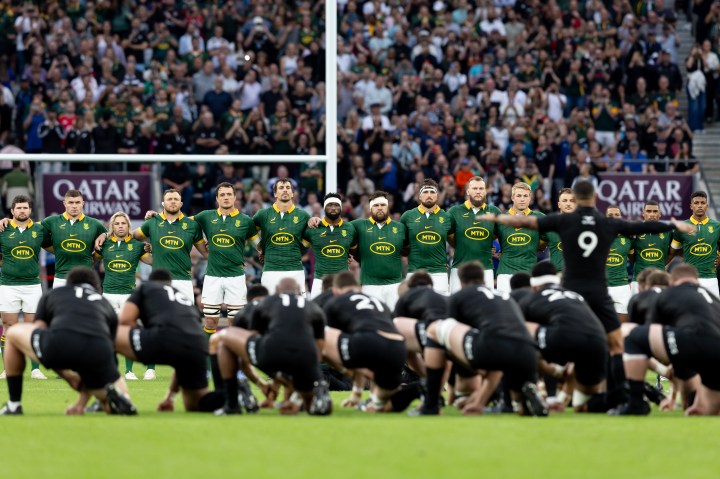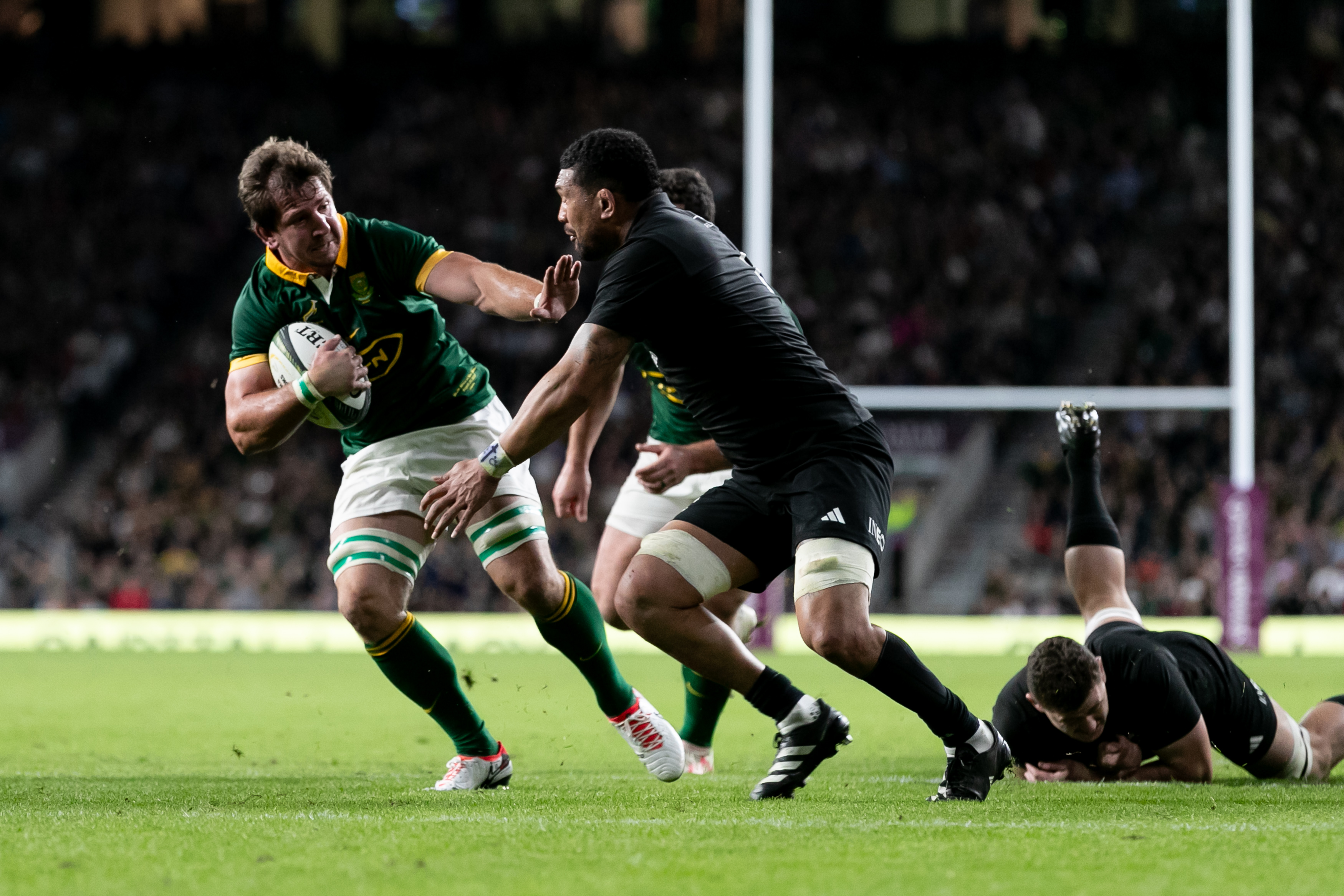BALANCING RISK
Gutsy Springboks selection produced sports’ most talked about 7-1 since Germany thrashed Brazil

The Springboks’ decision to field seven forwards on the bench against the All Blacks has led to some reasonable and unreasonable debate about substitutes in rugby.
The Springboks’ clash against the All Blacks at Twickenham last week led to the second most famous, or infamous, depending on your perspective, 7-1 in the history of sport.
Germany’s walloping of hosts Brazil in Belo Horizonte at the semi-final stage of the 2014 Fifa World Cup, remains the most talked about 7-1 in sports history.
But over the past week, the reaction to Bok coach Jacques Nienaber’s decision to field seven forwards and only one back on the bench against New Zealand has veered from hysterical to ridiculous.
The Boks won the match 35-7 against a 14-man All Blacks. But that wasn’t the most important take away for some rugby pundits.
An extra man in the famed ‘bomb squad’ appears to have tilted the rugby world on its axis…at least that is what some would have us believe.

The scoreboard shows the final score following the 2014 Fifa World Cup Brazil Semi Final between Brazil and Germany. (Photo: Chris Brunskill Ltd/Getty Images)
‘Abusing the bench’
You’d swear the Boks were somehow waging war on the sport of rugby when all they did was replace the injured Willie le Roux, who had bruised ribs, with Kwagga Smith.
Smith is officially a flank. But let’s not forget that he was a sevens star with the Blitzboks, winning a Commonwealth Games gold medal, an Olympic bronze and two World Sevens Series titles. He’s actually a forward in a back’s body.
At 94kg Smith is lighter than centres Andre Esterhuizen, Jesse Kriel, Damian de Allende and flyhalf Handre Pollard, so quite how this tactic will be the ruin of a game with much bigger problems, is unclear.
Matt Williams, a former Scotland coach, was incensed by a coaching decision well within the laws, that came with more inherent risk for the Boks than it did for the All Blacks.
“South Africa are just abusing the bench at the moment,” Williams said on the Off The Ball podcast. He said the bench was designed for “safety reasons, so that people didn’t come on in positions they weren’t trained for, so we didn’t have injuries”.
“World Rugby must act on this; the way you deal with this is, say, you have to have three backs on the bench.”

Flank Kwagga Smith replaced fullback Willie le Roux on the Springboks bench to face the All Blacks shortly before kick-off last week. Smith scored a second half try as the Boks won 35-7 at Twickenham. (Photo: Juan Jose Gasparini/Gallo Images)
No breach of the law
Just what safety reason was breached is also unclear.
Only props and hookers, in other words front rowers, must have like-for-like replacements according to regulations. Those are technical scrumming positions where great force is applied to the necks and shoulders of the players in the front row. They have trained for years, with specific methods to mitigate as much as possible against catastrophic neck and back injuries.
But the danger for rest is similar across the field. While different positions have specific tasks and roles, the Boks could choose to play Cheslin Kolbe at scrumhalf if they wish. There is no law demanding that a recognised halfback plays scrumhalf.
Franco Mostert is a lock who can play flank. Must he only be considered as a lock on the bench? Damian Willemse can play in multiple positions across the backline. Must he only be allowed to play in one?
How many times has a centre been deployed as a flank when a team has lost a looseforward to a yellow or red card? It’s ludicrous to even make a meal about this.
Nienaber explained it afterwards.
“With the way games have been playing out, there are times when your forwards have to play in the backline, and this offered us the same option,” Nienaber said.
“It gave us a taste of how to manage things if we perhaps get an injury in a match. Obviously, the least risk would be selecting a five-three split, and a six-two split holds a little more risk, and then a seven-one split is the most-high risk.”
Jake White, a traditional rugby man if there was one, saw no issue with it. In fact, he took the line that most sensible people did, which was that it was a risk for the Boks.
“As a coach, 7-1 is a helluva risk,” White said during a panel discussion at News24’s On the Record summit at the Kyalami Convention Centre.
“If you lose a guy in the first minute to anything, that’s it. You have no more backs. Imagine a play-off, where you might have to play extra time. The reality is it might come back to bite you.
“That, for me, was the significant thing. Everyone here was marvelling but didn’t appreciate what a risk it is. Also, the All Blacks lost two props, played with a red card for 35 minutes and had injuries to a few key players. In that situation, you probably should be expected to win by that much, which the Boks did.”

The ‘bomb squad’ of Malcolm Marx, Steven Kitshoff and Vincent Koch enter the field against Wales at Cape Town Stadium in 2022. (Photo: Gordon Arons/Gallo Images)
Fewer substitutes?
Williams’ raised the point that benches should be regulated as a 5/3 split between forwards and backs, which is going to be impossible to police. And unnecessary.
Player safety is the only issue relevant to reserves, which is why the front row is specifically covered in the regulations.
It does perhaps raise a debate about the amount of substitutes that rugby allows. That’s an entirely different argument and perhaps one worth having.
Respected sports scientist Professor Ross Tucker took to social media this week to outline some of the data he has access to, relating to replacements in rugby.
“I don’t think the difference between 50 vs 80 min is enough to radically transform the athlete, the tasks are still too similar,” Tucker wrote on X (formerly Twitter).
“But more to the point, what the proponents for fewer subs are omitting, is the recognition that fatigue is itself a risk factor for injury. And so, subs, while introducing a set of risk factors (power, mass) are also mitigating a risk factor (fatigue).
“There is likely a trade-off between these, and nobody yet knows how they interact. We do know that fatigue is a major risk, and in fact, we’ve just submitted a paper for review that shows that adding subs doesn’t increase risk, but may decrease it.
“Analysis that is currently underway shows that when we look specifically at the tackle and ask how the addition of a sub (fresher player) to the tackle ‘relationship’ actually lowers the overall risk.
“Two subs makes it lower still, compared to two starters (or fatigued players). So, risk comes down with subs, it doesn’t go up.
“But even within this, there is nuance. If you think of a tackle as a ‘dance’ involving two players, overall risk is slightly lower, or unaffected, when one is a sub and one is a starter, but within that dance, the more fatigued player has more risk than the fresher player.
“It is true that the arrival of fresh players at say, minute 50, increases risk to players who’ve been on since minute zero. But overall risk is still lower (or the same, depending on some details). So, is it true to say: ‘subs increase injury risk’? No, overall, they reduce it.” DM


















 Become an Insider
Become an Insider
Thank you for a properly reasoned, well thought-out article on this issue. I agree that the noise and anger against the Boks’ coaches’ choice about the bench seem to have their roots in hysteria (and not a little “well, we (Ireland, Scotland, england) couldn’t do that, so it must be illegal”). What I hope the Boks really take from that match is how to boss their big opponents, and also keep their structure in the middle of mass substitutions… I think they did that pretty well, but could still stand to improve on the structure; things looked a little loose in the middle of the second half
Leave it to the coach and the Captain .. they are at the cliff face and know what’s right for the players…
Off the point,but I’m getting sick and tired of ex Bok coach Jake White and his so-called wisdom, sort out the bulls
As much as the Boks won against NZ, have never seen Kiwis play so badly !
I would have said their semifinal thrashing by England at RWC2019 (7-19!) wasn’t particularly good either. It’s Rassie’s rush defence – copied by England – that showed them up for the one trick ponies they actually are. Even though the Boks didn’t win their first game against the ABs, the writing was definitely on the wall.
Funny the affect that pressure has on your game plan?